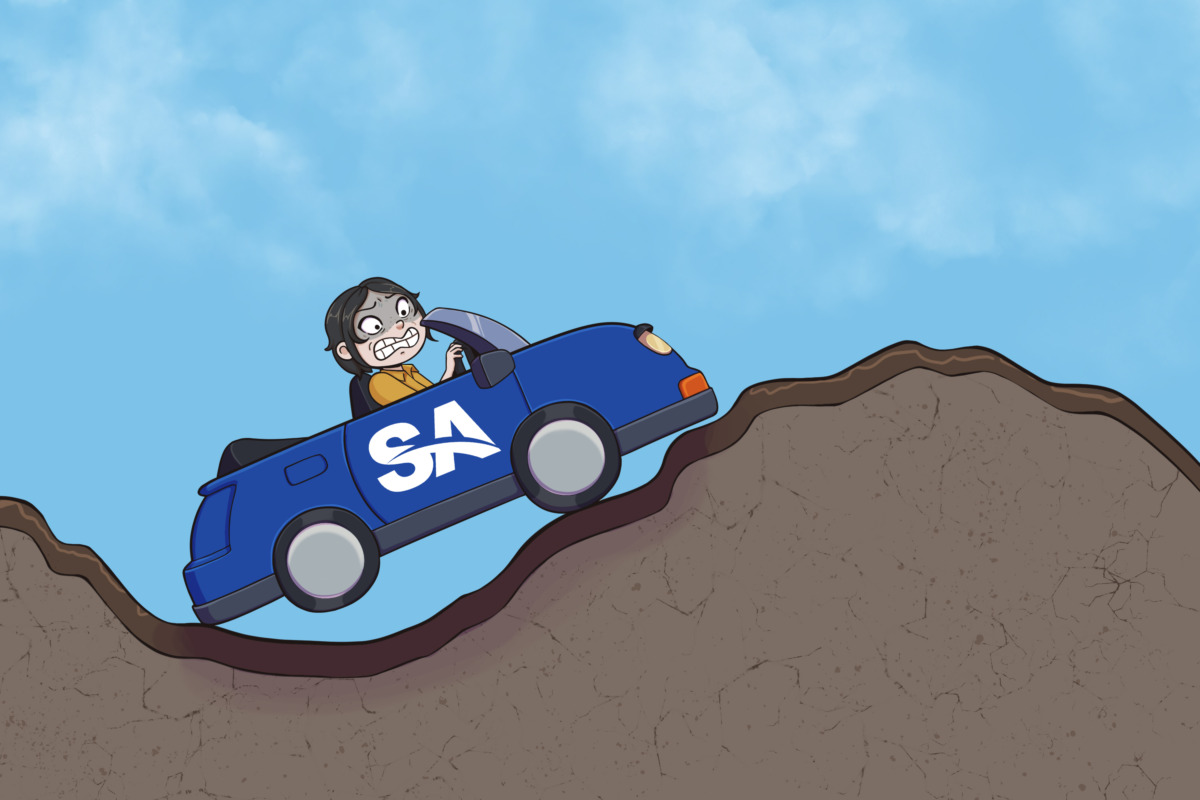This year’s board of directors show a lack of leadership as they lose sight of their duty.
This is the full and unchanged version of “A Rocky Path” the article seen on Pg. 2 of the Dialog, dated Aug. 28.
Each year, students of George Brown College (GBC) vote to elect peers to represent them on the Student Association (SA) board of directors (BOD).
These elected officials are meant to act on behalf of their peers, advocating for their needs and being leaders for an organization that has been serving students for more than 30 years.
There have been many board members over the years who have gone above and beyond their call of duty, not only ensuring the SA has been able to fulfill its directive but leaving their mark by creating real and lasting change within the college as a whole.
After celebrating a monumental anniversary earlier this year, one might think that the SA would be in a better position than ever to work towards a brighter future. Instead, the organization which has stood up for the betterment of students, looks like it needs to overcome a significant obstacle in its path.
This obstacle: the actions – or in some cases inaction – of the sitting BOD.
This includes refusing to pass important documents without any real explanation – leaving the SA at risk of legal repercussions, and an inability to complete tasks such as sending emails, without the use of artificial intelligence (AI); among other things.
This behaviour is not only detrimental to the SA’s partnership with the college, as the new academic year kicks off it ends up hurting the students who this organization has been tasked to serve.
Rosalyn Miller, general manager with the SA, believes that the sitting board members did not properly learn the organization and how to be elected leaders, before jumping in to try and implement drastic changes.
“The leadership has lost their way, that’s how I would frame it. They seem to have lost direction and purpose. The board members have not given themselves the opportunity to learn the organization, to fully understand all of the policies that’s interconnected with this one document that they seem to target. I believe that they do not take seriously the legal liabilities and they are, in essence if they continue down this path, creating such instability within the organization and such a potential leadership issue, that I do feel sorry for the board to come who will have to clean up their mess,” said Miller.
Her concern stems from the BOD’s persistent refusal to pass an updated version of the HR manual. This document is the original policies and procedures for the SAGBC staff members prior to unionizing.
When most full-time staff unionized, they were switched to a collective agreement. The remaining staff continue to work under the auspices of the HR manual. The manual, which underwent a routine update with the 2023/2024 board, was not able to be voted upon before the new group started.
This meant the incoming board – starting May. 1 – had to vote on this in their first meeting.
While the overall manual had been approved by committees and members who are still active in their roles from the previous year, the current board decided they needed to have their say and force the inclusion of items they believe necessary.
These recommendations, which are not known to anyone outside of the GM and voting members, are said to be illegal as they violate numerous policies and documents.
“What is the concern is the recommendations, of which there are plenty, that the board of May 1 (2024) sent to legal to revise the manual, to incorporate, which violates the collective agreement, employment standards, occupational health and safety and so many other policies and procedures and the VDAM (Voting Directors Accountability Manual). What they don’t want, Ben (Millard, SA Legal Counsel) or myself, to disclose openly what their recommended changes are, and they wanted to go in camera. Because what they have stated and requested has nothing to do with what the committee work was about, has nothing to do with what legal has proposed as required changes, and is so contradictory to so many policies, including their own VDAM, that it is outrageous,” Miller noted.
She adds that the board is aware of the legal issues they face, yet they continue down their current path.
“I was very clear. I put that on record, and… legal has said to them in the June meeting, it is illegal what you are attempting to do. So given that if they continued on this course, several things will happen. There will be legal actions coming to this Student Association. That is unfortunate, because it’s the fees of the students that will be utilized to deal with this bad behavior and conduct, and that’s what it is, poor behavior and conduct. [It is imperative] for a sitting board of people elected by students to carry out key actions, not to destroy and dismantle an organization.”
The BOD finally passed the HR manual at their most recent meeting, Aug. 19.
Another issue which has been noticed among this board is a prevalence for using AI.
With the rise of this technology, it’s not surprising to see companies starting to incorporate this into how they work. However, using AI in an academic setting raises concerns regarding plagiarism as it would be difficult to ascertain what was written by a student versus a computer.
Thankfully, detectors exist online which can aid in figuring out what is likely to be created by a human vs. AI.
It seems as though the BOD do not know this exists, because for months now many members have used AI for even a simple task like responding to an email.
In fact, in the upcoming 2024/2025 Sourcebook – the annual dayplanner created by the SA for students – multiple executive member’s answers to questions, which introduce them to students, were 100 per cent AI generated.
This of course, does not include the previously mentioned emails written with AI, among other items.
Considering their apparent affinity for using this technology, it’s a shame that a longtime staple of the annual Sourcebook – a welcome message to the students on behalf of the board – will be missing for the first time in decades, because the top members of the board couldn’t be bothered to ask AI to do it, despite months of notice to complete the task.
Putting aside these issues, after only a few months on the job the BOD seems to have not accomplished much. This includes a lack of campaign promises being brought to the board as a whole.
Even the smallest of promises requires a great deal of research and work before it can be implemented. So, when some promises such as a universal bus pass (U-Pass), cheap/free parking, internships, and the like are not brought to the board early, it greatly increases the chance that none of these things will ever become reality.
This not only decreases the trust that students will have in their elected officials, but also keeps them from being able to access things which can enhance their academic experience.
While there are many things which point to the board not being up to the leadership task before them, Miller believes their current agenda has ended up getting them lost on the wrong path.
“I think what they’re doing is they’ve lost sight of their role as a governing under the not-for-profit corporation’s act and the governance model that this organization is built on. They’re a governance body, they are not management supervisors.”
All members of the 2024/2025 board were contacted for comment, they all refused to speak before publication.


